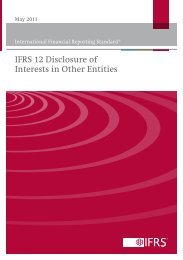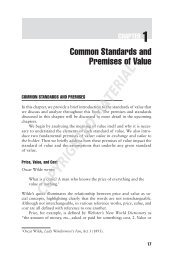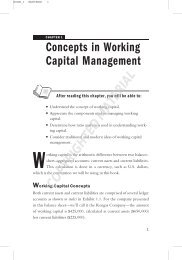ISSUE 5 2008 - Sweet & Maxwell
ISSUE 5 2008 - Sweet & Maxwell
ISSUE 5 2008 - Sweet & Maxwell
Create successful ePaper yourself
Turn your PDF publications into a flip-book with our unique Google optimized e-Paper software.
406 Case & Comment [<strong>2008</strong>]<br />
as those could not impinge on the obligation of confidentiality between lawyer and<br />
client. Lawyers would do their best to comply with the requirement within the<br />
limits of the rules governing legal professional privilege, with the result that the<br />
court might be less well informed of the pressures on lawyers to withdraw from the<br />
defence or explain the nature of the breakdown. The purpose of the regulations<br />
was to ensure that the client did not manipulate the system. Claims of a breakdown<br />
in the professional relationship between lawyer and client were frequently made<br />
by defendants. If judges intended to reject an application for a change of legal<br />
representative they might well explain to the defendant that the consequence might<br />
be that the case would continue without him being represented at public expense.<br />
If defendants terminated their lawyer’s retainer for improper motives, the court was<br />
not bound to agree to an application for a change of representation. The ultimate<br />
decision for the court was case and fact specific, and it did not follow from the<br />
repeated indication of the mantra ‘‘loss of confidence’’ that an application would<br />
be granted.<br />
(3) Judges should seek to find a common-sense solution to the kind of problems<br />
to which the withdrawal of counsel or a change of instructions could give rise,<br />
clearing up possible misunderstandings and, as best they can, introducing the calm<br />
and balance which sometimes can evaporate in the forensic process. However, it<br />
would rarely be right for trial judges, midway through a trial, to be required to<br />
engage in a personal discussion with defendants about their defence, and whether<br />
it was changing, or the state of the professional relationship with their lawyers, and<br />
certainly not if satisfied that a defendant was attempting to manipulate the process.<br />
Where barristers or solicitors were invited to take on a defence case at a very late<br />
stage or halfway through a long trial, the starting point was that trial judges had to<br />
decide whether, and if so for how long, they were prepared to adjourn a trial to<br />
accommodate new counsel. The responsibility was vested exclusively in the judge.<br />
If the judge’s decision produced an injustice or deprived the defendant of the fair<br />
trial to which he was entitled, the remedy was to be found in the Court of Appeal.<br />
The rules of the legal professions had to defer to and be consistent with those<br />
principles.<br />
(4) The cab-rank rule, and the rationale which supported it, applied whenever,<br />
and however late, the barrister was instructed. The absence of what the barrister<br />
would regard as sufficient time for the purpose of preparation did not constitute an<br />
exception. Paragraph 701(b)(ii) of the Code of Conduct directed that a barrister<br />
should not undertake any task for which ‘‘he does not have adequate time and<br />
opportunity to prepare for and perform’’. It did not constitute an exception to<br />
the cab-rank rule. Paragraph 701(b)(ii) was concerned to prevent barristers from<br />
accepting work over and above their existing commitments which they would<br />
not be able adequately to prepare and deal with in a professionally competent<br />
manner. The barrister faced with the problem which arose in the present trial<br />
was professionally required to soldier on and do the best she could. The process<br />
would normally encompass discussions with former counsel, taking stock generally,<br />
analysis of the issues likely to arise thereafter, and sensible applications to the<br />
trial judge for adjournment as and when the need arose. Rule 2.01 of the Law<br />
Society Rules was not directed to and the solicitor was not prevented from acting<br />
nor required to cease to act where an order of the court created difficulties and<br />
made it that much harder for him to discharge his professional obligations to his<br />
client. Such difficulties arose because of the judge’s ruling, not the absence of<br />
© SWEET &MAXWELL






